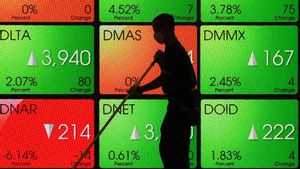JAKARTA - University of Indonesia (UI) Senior Economist, Faisal Basri, said that the strengthening of the rupiah and the composite stock price index (IHSG) that occurred in the last few days had nothing to do with a number of government policies related to handling COVID-19.
Faisal assessed that the positive trend in the two indicators was due to excess investor capital due to the economic policies of neighboring countries. This means that it has nothing to do with Indonesian government policies.
"So it must be remembered that the strengthening rupiah is a reflection of the supply of dollars, which has increased tremendously into Indonesia from global bond debt. So it has nothing to do with handling (COVID-19) bad or not," he said, in a virtual discussion, Wednesday, 10 June.
According to Faisal, currently foreign countries are pouring out monetary policies and incentives. Such as stimulus to quantitave easing which causes investors to experience excess liquidity. In the midst of this excess liquidity, they chose to rotate their money by buying government debt securities.
"Debt securities denominated in rupiah have very high interest rates of 7-8 percent. They entered Indonesia to buy government debt securities because of their interest but not for long-term purposes," he said.
Seeing the way the rupiah has strengthened like that, Faisal is not sure that the rupiah will continue to be strong. Because, if the foreign capital flow is withdrawn for any reason, either because of the poor handling of COVID-19 in Indonesia or because of global problems, Bank Indonesia must step in and patch foreign reserves.
Furthermore, Faisal said, there are many global bonds whose shares are 100 percent owned by foreigners in the form of foreign currency. As of December 2019, foreign ownership for local quarancy bonds was the highest in the world, reaching 38.7 percent.
A similar pattern, said Faisal, also occurred in the stock market. The inflow of foreign capital into the Indonesian stock market is due to potential profits, but this is only temporary.
Faisal said that the Indonesian stock market was not necessarily safe from outflows. This is because 40 percent of the portion is still controlled by foreign investors.
"Economists in various countries believe there is an increasingly unrelated relationship between the performance of the capital market and the money market and economic performance. Now foreigners are also buying a lot recently because there are potential profits," he explained.
The re-entry of foreigners in the Indonesian stock market since mid-May, said Faisal, needs to be watched out by local investors.
"We have to be careful because it is similar to the United States. The unemployment rate rose 14 percent, although yesterday it fell 13 percent but the market stock continued to rise," he said.
The English, Chinese, Japanese, Arabic, and French versions are automatically generated by the AI. So there may still be inaccuracies in translating, please always see Indonesian as our main language. (system supported by DigitalSiber.id)













